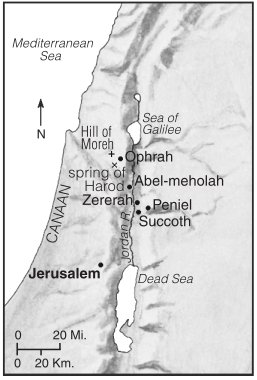
Gideon’s Battle
Gideon routed thousands of Midianites, chasing them to Zererah and Abel-meholah.
Open Bible Data Home About News OET Key
OET OET-RV OET-LV ULT UST BSB MSB BLB AICNT OEB WEBBE WMBB NET LSV FBV TCNT T4T LEB BBE Moff JPS Wymth ASV DRA YLT Drby RV SLT Wbstr KJB-1769 KJB-1611 Bshps Gnva Cvdl TNT Wycl SR-GNT UHB BrLXX BrTr Related Topics Parallel Interlinear Reference Dictionary Search
A B C D E F G H I J K L M N O P Q R S T U V W XY Z
GIDEON
Judge of Israel, son of Joash, of the clan of Abiezer and the tribe of Manasseh. Of the 12 judges of Israel, more verses are devoted to Gideon than any other—Samson running a close second. The narrative in which he is the central character antedates the Christian era by roughly 11 centuries.
Following seven years of cruel oppression by the Midianites, Israel cried out to the Lord for relief (Jgs 6:6). An unknown prophet informs the Israelites that their miserable conditions stem from their forgetting to give exclusive devotion to the one true God. God sends his angel to Gideon. A touch of humor earmarks the angel’s greeting, for the “mighty warrior” (v 12) is threshing wheat secretly for fear of the Midianites. Yet God addresses Gideon in realization of what his mighty power is able to accomplish in him (vv 14-16, 34). Conscious of his own weakness and the formidable task before him, Gideon is an ideal vehicle for God’s tremendous work of deliverance (cf. 1 Cor 1:27; 2 Cor 12:10).

Gideon’s Battle
Gideon routed thousands of Midianites, chasing them to Zererah and Abel-meholah.
Gideon’s first task is to tear down his father’s altar to Baal and the adjacent one to Asherah, Baal’s female consort (cf. Is 42:8). Knowing that the people would resist such an act, Gideon and his servants destroy these images of debased Canaanite religion at night. The following day the men of Ophrah confront Gideon and seek his life in retaliation for the act. Joash pleads the cause of his son, inviting Baal, if he indeed is deity, to contend for himself. Out of this confrontation the name Jerubbaal (“let Baal contend”) is ascribed to Gideon (Jgs 6:32).
Yet Gideon is a man of inconstant faith, and his desire of further assurance is not rebuked as God graciously and patiently accedes to his requests concerning the dew and the fleece (Jgs 6:36-40). Subsequently Gideon is informed that mere numbers will not assure victory. Moreover, there must be no doubt whatever as to the true source of Israel’s liberation (7:2). From 32,000, Gideon’s troops are trimmed down to only 300 by an unusual method of reduction (vv 3-7). A secret reconnaissance mission to the outskirts of the oppositions’ camp enables Gideon to receive further strengthening as he and his servant Purah overhear a Midianite soldier reveal his dream indicating Israel’s imminent victory (vv 13-14). In response to this additional encouragement, he worships the Lord (Jgs 7:15; cf. 6:24).
Divided into three companies, Gideon’s army stations itself at night outside the Midianite stronghold. At Gideon’s signal each man blows a trumpet (made from an animal’s horn) and smashes an empty jar containing a torch, shouting, “A sword for the Lord and for Gideon!” (Jgs 7:20). The effect of the clamor is overwhelming. Thinking themselves outnumbered, the confused and disheartened Midianites flee eastward across the Jordan. In hot pursuit, Gideon’s men are joined by Israelites from Naphtali, Asher, and Manasseh, who follow the enemy into the Transjordan area. The men of Ephraim, whose efforts are now called upon for the first time, capture and kill two of the Midianite leaders. Angry with Gideon for failing to enlist their services earlier, the Ephraimites are nonetheless appeased by Gideon’s tactful response to their queries (8:1-3).
Gideon’s unselfishness shines in response to the people’s desire to make him king, but he declines (Jgs 8:22-23). He does, however, receive an immense personal fortune from the spoils of war (vv 24-26). The unfortunate conclusion of Gideon’s story relates to his making an ephod from the gold won in battle. Perhaps a garment patterned after the high priest’s or a freestanding image, the object ensnares the people, and they worship it at Ophrah (v 27). In 2 Samuel 11:21 Gideon’s alternate name, Jerubbaal, becomes Jerubbesheth, “Baal” being replaced with the Hebrew word for “shame” (besheth).
Gideon has been singled out in the Letter to the Hebrews as a hero of the faith whose trust in God brought glory to the Lord (Heb 11:32, KJB “Gedeon”). As far back as the time of Isaiah, “the day of Midian” had become proverbial for deliverance accomplished by the hand of God apart from human strength (Is 9:4).
See also Judges, Book of.